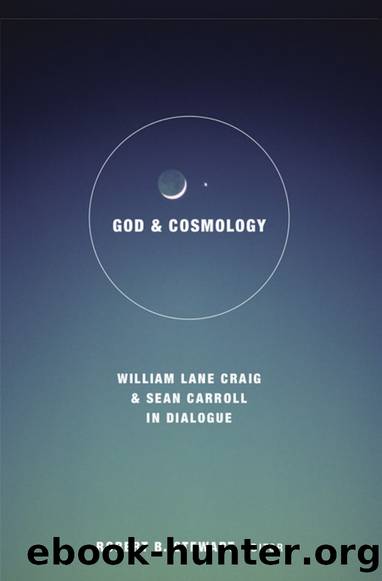God and Cosmology: William Lane Craig and Sean Carroll in Dialogue by Robert B. Stewart

Author:Robert B. Stewart [Stewart, Robert B.]
Language: eng
Format: epub
ISBN: 9781506410777
Barnesnoble:
Published: 2019-06-24T19:18:18+00:00
4
The Fine-Tuning for
Discoverability
Robin Collins
I. Introduction
One of the most persuasive evidences for the existence of God from the cosmos is the argument from the fine-tuning of the cosmos for the existence of life, the so-called anthropic fine-tuning. This refers to the fact that the laws, initial conditions, and fundamental parameters of physics must be precisely set for life to exist. The relevant kind of life depends on the hypotheses that the evidence is supposed to support, which, in the case of theism, is embodied conscious agents who can interact with each other, based on what they perceive as moral criteria. For convenience, I will simply use the abbreviation âECAsâ for such agents. The most commonly cited case of anthropic fine-tuning is that of the cosmological constant.1 If it 1. More accurately, it is the fine-tuning of the effective dark energy density of the universe, which is the sum of Einsteinâs original cosmological constant with various energy fields that, of themselves, would cause an accelerated expansion or contraction of the universe. However, 141
God and Cosmology
were not within one part in 10120 of its theoretical possible range of values, either the universe would expand, or collapse, too quickly for galaxies and stars to form, and hence, ECAs to exist. There have been a variety of challenges to the fine-tuning evidence itself, and whether it supports the existence of God or a multiverse. I have developed a detailed argument elsewhere2 that the fine-tuning evidence does provide strong confirmatory evidence for theism over naturalism.
Further, I have argued that the underling mathematical structure of the universe is much more elegant than would be expected under naturalismâsomething often noted by scientists. Here, I primarily want to explore another kind of fine-tuning and its implications for this debate: the fine-tuning of the universe for developing scientific technology and being scientifically highly discoverable, which I will just call the fine-tuning for discovery. By this fine-tuning, I mean that the laws, fundamental parameters, and initial conditions of the universe must be just right for the universe to be as discoverable as ours. After presenting examples to illustrate this kind of fine-tuning, I will argue that if this kind of fine-tuning exists, in general, it cannot be explained by a multiverse hypothesisâby far the leading non-theistic explanation for anthropic fine-tuning. Further, I will show how the idea that the universe is fine-tuned for discovery answers some other commonly raised objections against the fine-tuning argument, and finally, I will look at its potential predictive and explanatory power.
Finally, to be absolutely clear, my project in this chapter is not so much to argue for the existence of God as it is to explicate a place the cosmological literature has typically talked about it in terms of the fine-tuning of the cosmological constant.
2. Robin Collins, âThe Teleological Argument: An Exploration of the Fine-Tuning of the Universe.â In The Blackwell Companion to Natural Theology, William Lane Craig and J. P.
Moreland, eds., Malden, MA: Wiley-Blackwell, 2009, 202â81.
142
The Fine-Tuning for Discoverability where there is potentially new evidence, one way or another.
Download
This site does not store any files on its server. We only index and link to content provided by other sites. Please contact the content providers to delete copyright contents if any and email us, we'll remove relevant links or contents immediately.
The Lost Art of Listening by Michael P. Nichols(7506)
Why I Am Not A Calvinist by Dr. Peter S. Ruckman(4153)
The Rosicrucians by Christopher McIntosh(3519)
Wicca: a guide for the solitary practitioner by Scott Cunningham(3178)
Signature in the Cell: DNA and the Evidence for Intelligent Design by Stephen C. Meyer(3138)
Real Sex by Lauren F. Winner(3022)
The Holy Spirit by Billy Graham(2952)
To Light a Sacred Flame by Silver RavenWolf(2823)
The End of Faith by Sam Harris(2742)
The Gnostic Gospels by Pagels Elaine(2531)
Waking Up by Sam Harris(2459)
Nine Parts of Desire by Geraldine Brooks(2368)
Jesus by Paul Johnson(2362)
Devil, The by Almond Philip C(2331)
The God delusion by Richard Dawkins(2309)
Heavens on Earth by Michael Shermer(2284)
Kundalini by Gopi Krishna(2184)
Chosen by God by R. C. Sproul(2164)
The Nature of Consciousness by Rupert Spira(2108)
